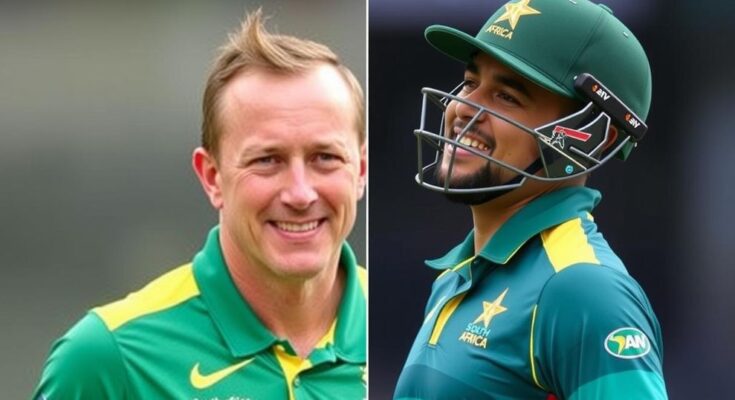Cricket South Africa (CSA) seeks a united front with the England and Wales Cricket Board (ECB) against Afghanistan’s Taliban regime, supporting a boycott of the upcoming Champions Trophy match in response to oppression of women’s rights. CSA and sports leaders call for a collective stance from ICC members to advocate for women’s cricket and influence meaningful change.
Cricket South Africa (CSA) has aligned itself with the England and Wales Cricket Board (ECB) in advocating for a coordinated response concerning calls to boycott the impending Champions Trophy match against Afghanistan. This motion arises from a letter endorsed by over 160 UK politicians urging England to withdraw from the match to protest against the Taliban’s actions against women’s rights. CSA recognizes that a unified stance by all International Cricket Council (ICC) members would greatly enhance the impact of their efforts to support women’s cricket in Afghanistan and initiate substantive change predominately towards women’s rights in the nation.
The participation of women in sports in Afghanistan has been severely restricted since the Taliban reclaimed power in 2021, resulting in numerous female athletes fleeing to safeguard their well-being. CSA president Rihan Richards emphasized the importance of a collective response, noting, “We are of the view that a more unified and collective approach from all ICC members will be more impactful.” Furthermore, the CSA condemned the oppression of women in Afghanistan as “abhorrent” and stressed the necessity for women’s cricket to receive equal recognition and resources.
The ICC’s regulations necessitate that full membership includes robust women’s cricket teams and developmental pathways, a stipulation that Afghanistan’s men’s team has, rather controversially, bypassed without facing sanctions. CSA referenced the critical nature of this issue, urging that Afghanistan’s participation in events must ideally align with ICC regulations concerning women’s cricket. Minister of Sports, Gayton McKenzie, has echoed the call for a boycott, underscoring the moral responsibility of cricketing federations to convey a meaningful message regarding the significance of women’s rights in sports, stating, “It would be hypocritical and immoral to look the other way today when the same is being done towards women anywhere in the world.”
South Africa is set to compete against Afghanistan in the Champions Trophy on February 21 in Karachi, within a competitive structure that features prominent teams such as Australia and England in Group B, alongside Afghanistan. The tournament is scheduled to occur from February 19 to March 9, hosted in Pakistan and a neutral venue in Dubai.
Cricket, as a global sport, often intersects with political and social issues, especially concerning rights and representation. The Taliban’s return to power in Afghanistan has dramatically affected the landscape for women’s sports in the country. There has been an international outcry against such oppressions, which has amplified calls for sports organizations to take a firm stand against regimes that violate fundamental human rights. The ICC’s stance regarding Afghanistan serves as a critical benchmark in determining how international sporting bodies confront sociopolitical realities in the context of their regulations and membership guidelines.
As the Champions Trophy approaches, the conversation surrounding Afghanistan’s participation becomes increasingly significant, reflecting broader social issues regarding gender equality in sports. The unified stance from Cricket South Africa and other cricketing bodies indicates a growing awareness and willingness to address human rights violations through sports. The outcome of their collective efforts may set a precedent for how sports organizations navigate the intersection of athletics and advocacy for women’s rights.
Original Source: www.bbc.com




